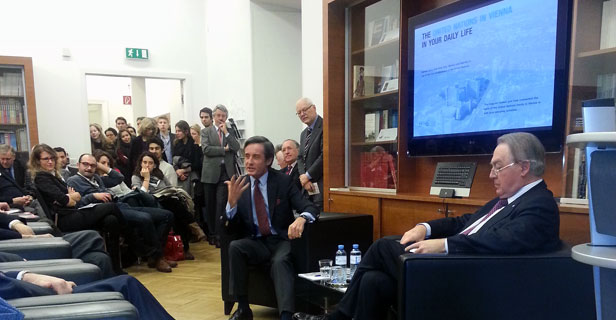
"The United Nations in Your Daily Life - Communicating the work of the UN" was the overall theme for a discussion forum with Under-Secretary-General for Communications, Peter Launsky-Tieffenthal hosted by the Foreign Policy and United Nations Association of Austria on 25 February 2013. The forum was moderated by Axel Wuestenhagen, a Board Member of Foreign Policy and United Nations Association of Austria and Ambassador Christine Stix-Hackl, Permanent Representative of Austria to the United Nations in Vienna opened the event. The occasion also served as the launch of a new web-book tool showcasing the practical relevance of the work of the Vienna-based United Nations programmes and offices to people's daily lives.
In her welcome remarks Ambassador Christine Stix-Hackl underlined the relevance of the organizations at Vienna International Centre in the current international framework. Highlighting a few areas of interest she drew attention to the United Nations Industrial Development Organization's (UNIDO) work in poverty reduction in developing countries, the United Nations Office on Drugs and Crime's (UNODC) campaign against cybercrime, and the current work of the United Nations Office for Outer Space Affairs (UNOOSA) such as the dangers of dealing with near-Earth objects made very topical by the recent case of a meteor impact in Russia. All these were practical examples of the UN presence in the daily life of the people here.
The main part of the event - a podium discussion with Under-Secretary-General Launsky-Tieffenthal - encompassed various questions related to communications, the practical work of the Department of Public Information, current challenges in shaping the image of the United Nations, the partnership work of the Department, its outreach activities to civil society and the NGO community, strengthening relations with the Academic community as well as efforts to work more closely with the creative community. Through the various questions from the audience the Under-Secretary-General also highlighted the Departments' work in the field through the network of UN Information Centres and Services as well as the efforts his office was making in reaching out to the widest audience through all possible creative means of traditional as well as new modes of communications and in as many languages as possible.
As a practical example of those creative efforts, UNIS Vienna Director Janos Tisovszky presented "The United Nations in Vienna in Your Daily Life" web-publication, a collaborative effort from all the communications experts and professionals of the UN system organizations, programmes and offices housed at the Vienna International Centre. Pulled together by the UN Information Service in Vienna, the web-book gives numerous practical examples connecting the work of the VIC based bodies with the outside world - putting the perspective of the individual at its centre. With the help of young volunteers a set of normal everyday activities were identified ranging from using the Internet, to going shopping at the supermarket and going on holidays. Apart from looking at some well known and obvious connections, the aim was to also highlight new and lesser known areas where the Vienna programmes have a practical benefit.
The most telling examples included synergies, where the efforts of the institutions together have a significant impact on the daily lives of ordinary people. For instance, the cooperation between the United Nations Scientific Committee on the Effects of Atomic Radiation (UNSCEAR), the International Atomic Energy Agency (IAEA) and the Preparatory in to evaluating and overcoming the hazardous effects of radiation. Or, the mutual actions of the United Nations Industrial Development Organization (UNIDO) and the United Nations Commission on International Trade Law (UNCITRAL) at ensuring the credibility of supermarket products or the joint efforts of the United Nations Office on Drugs and Crime (UNODC) and IAEA towards preventing the smuggling of stolen vehicles.
The web-based approach means the publication contains links to videos, photos and additional information and will be updated and added to with new material and additions.